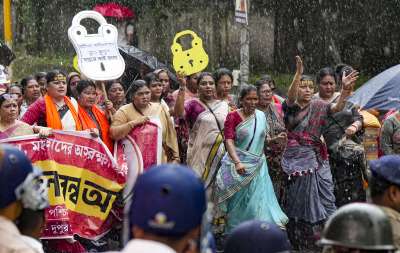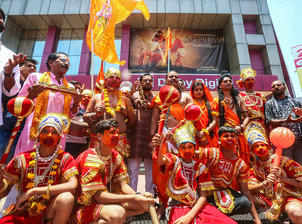Argument that children of same-sex married couple will be impacted incorrect; gay, lesbian persons can already adopt individually: Supreme Court

The Supreme Court on Wednesday countered the argument that recognition of same-sex marriage would impact the children of such couples, noting that lesbian and gay persons are already allowed to adopt children individually [Supriyo and anr v. Union of India].
A Constitution Bench led by Chief Justice of India (CJI) DY Chandrachud and also comprising Justices Sanjay Kishan Kaul, S Ravindra Bhat, PS Narasimha and Hima Kohli addressed the purported effects on children whose parents were of the same sexual identity.
"Incidentally, even if a couple is in a gay relationship or a lesbian relationship one of them can still adopt. So, the whole argument that this will create a sort of a psychological impact on the child is belied by the fact that even today as the law it stands, one can adopt. Once you have decriminalized homosexuality, therefore, it's open to people to live in together and one of you can adopt. It's just that the child loses the benefit of parenthood," said CJI ," the CJI said.
In direct response to the Central government's contentions that same-sex relationships were an urban elitist concept, the Court said there was no data to indicate the same, and such misconception might perhaps be due to the fact that urban people come out of the closet more
Today was the second day of arguments in the batch of pleas seeking legal recognition of same-sex marriage.
Yesterday, the Bench had proposed limiting the scope of the petitioners' submissions to recognition of such marriages under the Special Marriage Act, instead of also delving into various personal laws.
Solicitor General Tushar Mehta at the outset placed on record a fresh affidavit where the Central government had invited inputs from states on the matter.
"Excellent, then States already know about it," the CJI said.
Senior Advocate Mukul Rohatgi, appearing for the petitioners, said merely because a subject is derived from the concurrent list does not mean states have to be heard in a constitutional challenge.
"Insolvency was challenged before this Court and that was in Concurrent List as well, but states were not joined. The letter was issued yesterday and notice was issued 5 months ago. This could have been done earlier."
Rohatgi made the case that all benefits of the law flowing to heterosexual couples should flow to homosexual ones as well.
"Wherever husband and wife is used, make it gender-neutral by using 'spouse'; man and woman should be made 'person's. Thus, a large part of this will solve our projected interpretation of the Special Marriage Act and this must also apply to the acts across the spectrum."
Justice Kaul then said,
"Everything cannot change at once. Once its recognised, then you are married and if people then do not recognise you as married, then its a violation of our order if we agree with you."
Rohatgi emphasised that same-sex couples had to approach the courts since they have no representation in parliament, and are stigmatised by the majority.
"Popular morality cannot defer the decisions of this Court for the legislative process. Constitutional morality will become a habit for the people when the same is upheld by this very court."
During the course of the Senior Advocate's submissions, the Court went through Section 2(b) of the Special Marriage Act. The said proviso deals with 'degrees of prohibited relationships' for men and women who marry under the Act.
In the context of certain same-sex relations being prohibited under the same, the CJI remarked,
"If you see, this is a tacit implication that the Special Marriage Act did not contemplate same-sex marriage."
Justice Kaul then stated,
"Here we see sisters-daughter as prohibited relationship, but in many communities it is allowed. So, we are a diverse country."
Senior Advocate Abhishek Manu Singhvi, also for the petitioners, said that the right to choose is what lies at the heart of the issue.
"The heart of the matter is marital relationship. This is regardless of gender or gender identity. To manifest the idea of love into marriage regardless of the identities is the heart of the case. The obverse heart of the case is discriminatory denial to a section of the community to do it based on sex, sexual orientation, gender or gender identity."
Singhvi emphasised that the Special Marriage Act provides for a non-religious mode of marriage.
"So you are saying since Special Marriage Act is agnostic to faith, making it agnostic to sexual orientation is not a leap of faith. The basis of a classification cannot be conflated with a purpose," the CJI said in summation.
The Senior Counsel argued that same-sex couples are deserving of protection from even social welfare institutions, to ensure substantive fairness under law.
Senior Advocate Menaka Guruswamy, appearing for a petitioner, stressed that the Court's definition of marriage will affect how financial institutions treat same-sex couples.
The Bench was also faced with a question as to what would be the minimum age for marriage if same-sex marriage is permitted under the Special Marriage Act.
Section 4 of the Special Marriage Act stipulates conditions relating to solemnization of marriages. Sub-section 3 states that the male ought to have completed the age of twenty-one years and the female the age of eighteen years.
Justice Kohli sought to know how Section 4 of the Act would be read if gender-neutral terms are employed in it. When Singhvi suggested that for male marriage both could be 21, and for females both could be 18, CJI Chandrachud cautioned that the approach was not correct.
The CJI recollected that a plea by BJP leader Ashwini Kumar Upadhyay had been rejected where the minimum age of 18 years for females to get married was challenged. He noted that the plea was dismissed stating that if the Court holds the provision unconstitutional, there would be no minimum age of marriage and even a four-year-old girl could get married.
The hearing will continue tomorrow.

















